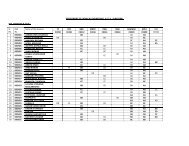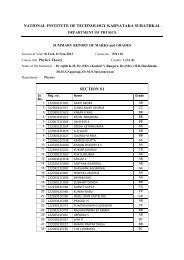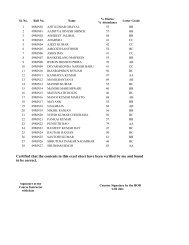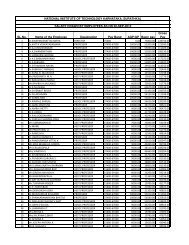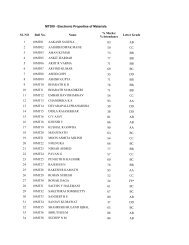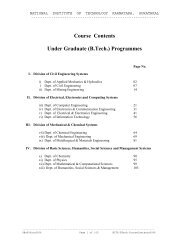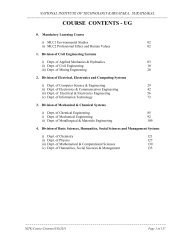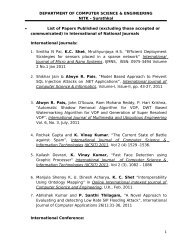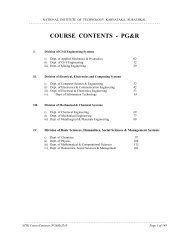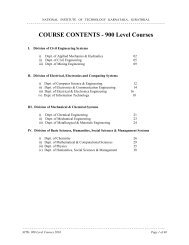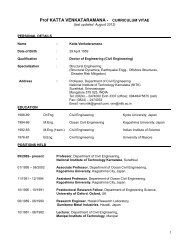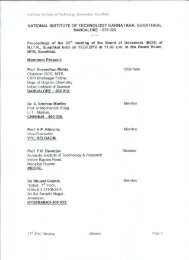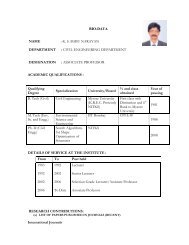course contents - ug - National Institute of Technology Karnataka
course contents - ug - National Institute of Technology Karnataka
course contents - ug - National Institute of Technology Karnataka
Create successful ePaper yourself
Turn your PDF publications into a flip-book with our unique Google optimized e-Paper software.
NATIONAL INSTITUTE OF TECHNOLOGY KARNATAKA, SURATHAKAL<br />
------------------------------------------------------------------------------------------------------------------<br />
Department <strong>of</strong> Electrical and Electronics Engineering<br />
EE100 ELEMENTS OF ELECTRICAL ENGINEERING (3-1-0) 4<br />
DC Circuits: Review <strong>of</strong> circuit elements, Voltage sources, Current sources, Source transformation, Mesh<br />
current and node voltage analysis <strong>of</strong> DC circuits. Network reduction techniques, Magnetic Circuits, self<br />
and mutual inductances. Analysis <strong>of</strong> single-phase circuits, Power-factor improvement. Analysis <strong>of</strong> threephase<br />
balanced systems and measurement <strong>of</strong> three-phase power. Transformers: Construction and principle<br />
<strong>of</strong> operation <strong>of</strong> single-phase transformers, Autotransformers. Three-phase induction motor: Types,<br />
Construction, Principle <strong>of</strong> operation, Characteristics, Starters, Applications. Single-phase induction<br />
motors, stepper motors and other special machines.<br />
Fitzgerald, D.E Higginbotham, A. Grabel, Basic Electrical Engineering, 4th Edition, McGraw – Hill<br />
Olle I. Elgerd, Basic Electric Power Engineering, Addision Wesley, 1977<br />
Edward H<strong>ug</strong>hes, Electrical <strong>Technology</strong>, 7th Edition, Longman, 1995<br />
H. Cotton, Advanced Electrical <strong>Technology</strong>, Wheeler, 1983<br />
MLC1 ENVIRONMENTAL STUDIES (2-0-0)<br />
2<br />
Mandatory Learning Course (MLC) as per §3.5 <strong>of</strong> the <strong>Institute</strong> Academic Regulations-UG.<br />
EE200 CIRCUIT THEORY (3-1-0)<br />
Review V-1 characteristics <strong>of</strong> circuit elements and sources, Network Graphs, Network 4 variables,<br />
Introduction to state variable, Review <strong>of</strong> Kirch<strong>of</strong>f�s laws, writing the equilibrium equation on the Loop<br />
and Node bases for network with R,L &C, and network with coupled circuits, order <strong>of</strong> the circuits, natural<br />
frequency <strong>of</strong> networks, Introduction to system functions, Time domain response <strong>of</strong> simple circuits for<br />
constant and sinusoidal excitations, sinusoidal steady state analysis <strong>of</strong> networks, Resonance, Network<br />
Theorems, Polyphase circuits,Wye-delta connections, sinusoidal steady state analysis <strong>of</strong> balanced and<br />
unbalanced system Introduction to circuit analysis with non-sinusoidal waves.<br />
Ernst A. Guillemin, Introductory Circuit Theory, John Wiley and Sons, 1953.<br />
William H. Hayt Jr., Jack E. Kemmerly, Steven M. Durbin, Engineering Circuit Analysis, 6 th Edition,<br />
TMH, 2002.<br />
Charles A. Desoer, Ernest S. Kuh, Basic Circuit Theory, McGraw-Hill, 1969.<br />
Russell M. Kerchner, George F. Corcoran, Alternating Current Circuits, 4 th Edition, Wiley Eastern, 1960.<br />
K.Y. Tang, Alternating Current Circuits.<br />
EE207 ELECTROMAGNETIC THEORY (3-1-0) 4<br />
Static electric and magnetic fields. Time varying fields. Maxwell�s equations. Boundary value problems.<br />
Propagation <strong>of</strong> plane waves in dielectric and conducting media. Introduction to computational methods in<br />
electromagnetics.<br />
William H. Hayt Jr., Engineering Electromagnetics.<br />
John D. Kraus, Electromagnetics.<br />
Martin A. Plonus, Applied Electromagnetics.<br />
E C. Jordan, K. G. Balmain, Electromagnetic Waves and Radiating Systems..<br />
Simon Ramo, John R. Whinnery, T..Van Duzer , Fields and Waves in Communication Electronics.<br />
EE212 TRANSFORMERS AND INDUCTION MACHINES (3-1-0)<br />
Basics <strong>of</strong> Electromagnetics, Magnetic Circuits, Transformers, Construction, Equivalent 4 Circuits, Phasor<br />
diagrams, efficiency, voltage regulation, inrush phenomena, harmonics, three phase transformers,<br />
Distribution transformers, tap-changers, testing, maintenance and fault diagnosis, parallel operation,<br />
principles <strong>of</strong> autotransformer, pulse transformer, Basic Concepts <strong>of</strong> Design.<br />
Basics <strong>of</strong> electromechanical energy conversion principles, energy, co-energy, voltage generation, torque<br />
production, Induction motors, construction, principle <strong>of</strong> operation, characteristics, performance analysis,<br />
starting, speed control, harmonic torques, testing, maintenance and fault diagnosis, induction generator<br />
---------------------------------------------------------------------<br />
NITK-Course Contents(UG)2010 Page 54 <strong>of</strong> 134



